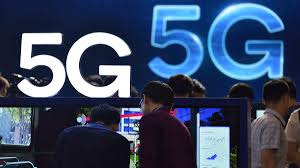US Senators question how to roll out 5G without Chinese technology

San Francisco: With the imminent arrival of 5G to more US cities, several United States senators expressed concern over how to roll out the new technology without the help of Chinese equipment makers.
5G technology is the next generation of ultra-fast wireless connections. The four main carriers in the US -— Verizon, Sprint, T-Mobile and AT&T, which owns CNN’s parent company WarnerMedia — have vowed not to use components, such as chips, from Huawei or other Chinese companies. These larger US companies never relied on Chinese technology when deploying past networks, so it’s a matter of continuing to avoid it going forward. Smaller and more rural US-based carriers do have Huawei in their networks and would need to work to phase them out.
Huawei is the world’s biggest maker of telecommunications equipment, but the US government has growing concerns that using its technology could pose a national security threat.
Tensions between the US and China remain high. The US government is investigating Huawei for possible criminal behavior and is currently in the midst of a trade war with the country.
During a Senate Judiciary Committee hearing on Tuesday, Senator Dianne Feinstein expressed concern over how China can gain sensitive information through companies like Huawei.
“I begin to question the whole 5G thing because it creates a situation that can be used to do tremendous harm,” Feinstein said. “This is a very big deal because it could make our country incredibly vulnerable and we cannot let China do this, it’s that simple.”
US regulators have moved to limit federal funding for US carriers who use Huawei gear with their networks over fears the equipment could allow the Chinese government to eavesdrop on sensitive US communications. US officials embarked on an international campaign in February to discourage the use of Huawei components among its strategic partners.
But many of the US’ closest allies, including the UK with whom the US shares data, continue to use Chinese equipment, a practice that raises concerns about the security of US data.
Many European officials have acknowledged the risk but differ with the United States over whether it can be managed. In April, the Daily Telegraph reported the UK’s National Security Council — a body led by Prime Minister Theresa May — agreed to let Huawei help build the country’s 5G network. According to the leaked decision, Huawei would have relatively limited access to all but the innermost parts of the 5G network.
Robert Strayer, deputy assistant secretary for cyber and international communications and information policy, was one of two experts questioned during the hearing.
Strayer noted that China’s national intelligence law requires its citizens and organizations to cooperate with Chinese intelligence and security services.
“I think we should be very concerned and I think we should be concerned about the Chinese law that makes this permissible,” Feinstein said. “I think it should become a major element of State Department policy to try to straighten this out before we proceed and have real problems because Huawei has been very assertive.”
Strayer added that “because of the essential role that vendors play in networks and their maintenance, they could be ordered to undermine network security, to steal personal information or intellectual property, conduct espionage, disrupt critical services or conduct cyberattacks.”
Christopher Krebs, director of the Department of Homeland Security’s Cybersecurity and Infrastructure Security Agency (CISA), was also questioned during the hearing.
The other cause for concern: China could beat the US and other countries in the race to roll out 5G networks and 5G-compatible devices.
Proponents of 5G say getting a critical mass of consumers on board with the technology before other countries could help US businesses become leaders in the industries that will depend on 5G connectivity, such as self-driving cars or telemedicine.
“[It] seems to me that we need to up our 5G game because if there’s nobody other than China we’ve got a problem,” said Senator Lindsey Graham, chair of the Senate Judiciary Committee.





